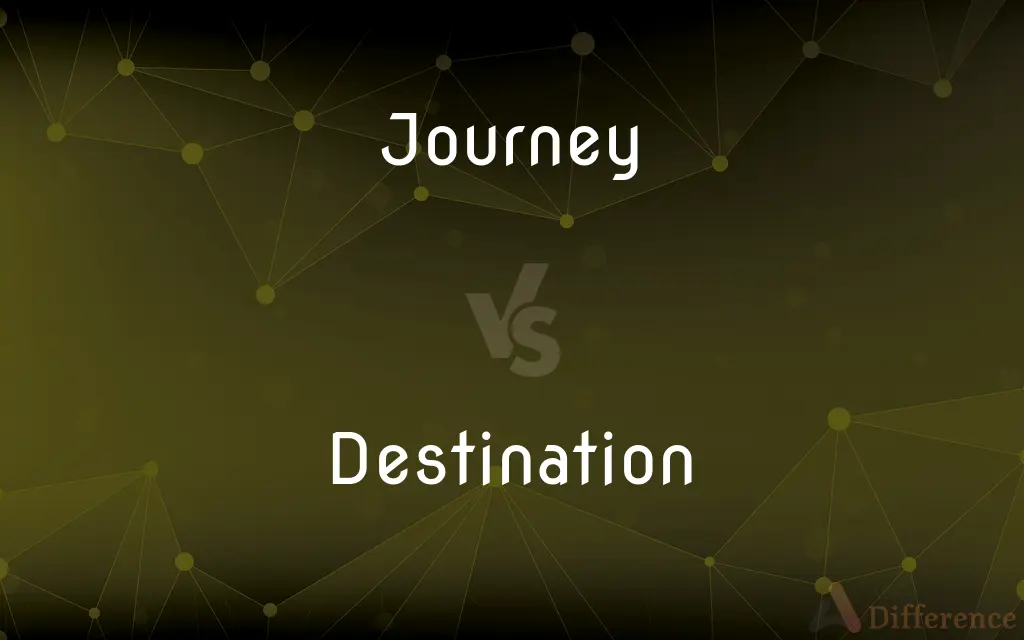Journey vs. Destination — What's the Difference?
By Maham Liaqat & Fiza Rafique — Updated on April 20, 2024
A journey refers to the process of traveling from one place to another, often emphasizing the experience itself, while a destination is the end point or goal of a journey, focusing on the place or achievement being aimed for.

Difference Between Journey and Destination
Table of Contents
ADVERTISEMENT
Key Differences
The concept of a journey involves the travel or progress from one location to another, with an emphasis on the experiences and growth that occur during the process. In contrast, the destination refers to the final point of the journey, whether it's a physical place, a career goal, or a personal achievement, highlighting the conclusion of travel or effort.
While the journey is characterized by the path taken, experiences gained, and lessons learned along the way, the destination is defined by the achievement of specific objectives or arrival at a particular place. This dichotomy is often used metaphorically in discussions about the value of experiences versus outcomes.
In many philosophical and literary contexts, the journey is often valued more than the destination, as it is believed to offer personal development and unexpected insights. On the other hand, focusing on the destination can provide motivation and a clear sense of purpose, driving individuals or groups towards achieving their goals.
Travelers and achievers alike balance the significance of the journey with the importance of reaching their destination. While some may prefer the spontaneity and growth that comes from the journey, others might prioritize the satisfaction and completion that the destination offers.
In terms of narrative and storytelling, the journey allows for the development of characters and plot through challenges and interactions, whereas the destination often provides closure and resolution to the narrative, delivering a sense of accomplishment and fulfillment.
ADVERTISEMENT
Comparison Chart
Definition
The act or process of traveling from one place to another.
The final goal or place that ends the journey.
Emphasis
On experiences and growth during the process.
On achieving specific objectives or arriving at a certain place.
Literary Value
Often seen as more enriching and character-building.
Provides motivation and a sense of purpose.
Role in Narrative
Develops plot and characters through challenges.
Offers closure and resolution to the story.
Philosophical View
Valued for personal development and insights.
Considered important for fulfillment and completion.
Compare with Definitions
Journey
Often involves various stages, each contributing to the traveler's experience.
His journey to becoming a chef took him through different cuisines and cultures.
Destination
In travel, it refers to the location to which a person is going.
Paris has always been one of the top tourist destinations in the world.
Journey
Characterized by the progression and the process rather than the outcome.
The artist's journey was marked by continual learning and experimenting.
Destination
Can symbolize the achievement of one's goals or ambitions.
His destination was the CEO position at the company he had worked at for years.
Journey
The experience of traveling from one place to another, often valued for personal growth.
The journey across the country was filled with unexpected adventures and challenges.
Destination
The place or goal aimed for at the end of a journey.
The peak of Mount Baldy.
Journey
Can refer to both physical travel and metaphorical progress in life or career.
The journey to self-discovery can be as arduous as any trek through mountains.
Destination
Often used to denote the desired outcome of a project or endeavor.
The destination of her years of research was a revolutionary new drug.
Journey
A metaphor for personal or professional development over time.
Her journey through medical school was both challenging and rewarding.
Destination
Marks the conclusion or final point in various contexts.
The final destination in the video game proved to be the most difficult challenge yet.
Journey
An act of travelling from one place to another
An eight-hour train journey
Destination
The place to which one is going or directed.
Journey
Travel somewhere
They journeyed south
Destination
The ultimate purpose for which something is created or intended.
Journey
The act of traveling from one place to another, especially when involving a considerable distance; a trip.
Destination
(Archaic) An act of appointing or setting aside for a specific purpose.
Journey
A distance to be traveled or the time required for a trip
A 2,000-mile journey to the Pacific.
The three-day journey home.
Destination
(countable) The place set for the end of a journey, or to which something is sent; place or point aimed at.
Arrive at your destination
Journey
A process or course likened to traveling, such as a series of trying experiences; a passage
The journey from addiction to recovery.
Destination
(archaic) The act of destining or appointing.
Journey
To make a journey; travel.
Destination
Purpose for which anything is destined; predetermined end, object, or use; ultimate design.
Journey
To travel over or through.
Destination
The act of destining or appointing.
Journey
A set amount of travelling, seen as a single unit; a discrete trip, a voyage.
The journey to London takes two hours by train.
Destination
Purpose for which anything is destined; predetermined end, object, or use; ultimate design.
Journey
(metaphorical) Any process or progression likened to a journey, especially one that involves difficulties or personal development.
The journey to political freedom
My journey of dealing with grief
Destination
The place set for the end of a journey, or to which something is sent; place or point aimed at.
Journey
(obsolete) A day.
Destination
The place designated as the end (as of a race or journey);
A crowd assembled at the finish
He was nearly exhuasted as their destination came into view
Journey
(obsolete) A day's travelling; the distance travelled in a day.
Destination
The ultimate goal for which something is done
Journey
(obsolete) A day's work.
Destination
Written directions for finding some location; written on letters or packages that are to be delivered to that location
Journey
The weight of finished coins delivered at one time to the Master of the Mint.
Journey
A group of giraffes.
Journey
To travel, to make a trip or voyage.
Journey
The travel or work of a day.
We have yet large day, for scarce the sunHath finished half his journey.
Journey
Travel or passage from one place to another, especially one covering a large distance or taking a long time.
The good man . . . is gone a long journey.
Journey
A passage through life, or a passage through any significant experience, or from one state to another.
We must all have the same journey's end.
Journey
The distance that is traveled in a journey{2}, or the time taken to complete a journey{2}; as, it's a two-day journey from the oasis into Cairo by camel; from Mecca to Samarkand is quite a journey.
Journey
To travel from place to place; to go from home to a distance.
Abram journeyed, going on still toward the south.
Journey
To traverse; to travel over or through.
Journey
The act of traveling from one place to another
Journey
Undertake a journey or trip
Journey
Travel upon or across;
Travel the oceans
Common Curiosities
Is it possible to have multiple destinations within a single journey?
Yes, a single journey can involve multiple destinations as milestones or objectives that mark progress along the way.
How does a journey contribute to personal growth?
A journey contributes to personal growth by exposing individuals to new experiences, challenges, and learnings that foster development and insight.
What makes a successful journey?
A successful journey is characterized by meaningful experiences, growth, and the achievement of personal insights or learning.
Can a destination change during a journey?
Yes, destinations can change as new information, experiences, or insights are gained during the journey.
Can the journey be more important than the destination?
Yes, many believe the journey offers more valuable experiences and personal development than merely reaching the destination.
Why do people focus on destinations?
Focusing on destinations provides clear goals and motivations, which can drive efforts and provide a sense of purpose.
What is the difference between a journey and a destination?
A journey refers to the process and experiences of traveling, emphasizing growth and discovery, while a destination is the end point or goal aimed for, emphasizing achievement and arrival.
How do people choose their destinations?
Destinations are often chosen based on personal or professional goals, desires for exploration, or specific outcomes desired from a project or endeavor.
What role does planning play in a journey?
Planning is crucial in a journey to ensure that the path taken is efficient, safe, and aligned with the desired outcomes or experiences.
How does culture influence the perception of journeys and destinations?
Cultural values and beliefs can shape how individuals value journeys and destinations, with some cultures emphasizing the importance of the process and others focusing on the outcome.
What are the psychological effects of focusing solely on the destination?
Focusing solely on the destination can lead to stress and dissatisfaction if goals are not met, potentially overlooking the benefits gained during the journey.
What are some common metaphors associated with journeys and destinations?
Common metaphors include life as a journey, career paths, spiritual quests, and educational endeavors, where destinations symbolize achieving life milestones or enlightenment.
How can one balance the importance of journeys and destinations?
Balancing the importance involves appreciating the experiences and growth during the journey while also keeping sight of the end goals or destinations.
Why might someone choose a challenging journey?
Challenging journeys are often chosen for the potential they offer for significant personal growth, resilience building, and the deep satisfaction of overcoming difficulties.
What are some examples of destinations in various contexts?
Examples include reaching a career goal, completing an educational degree, or arriving at a specific location after travel.
Share Your Discovery

Previous Comparison
Contest vs. Contend
Next Comparison
Footmark vs. FootprintAuthor Spotlight
Written by
Maham LiaqatCo-written by
Fiza RafiqueFiza Rafique is a skilled content writer at AskDifference.com, where she meticulously refines and enhances written pieces. Drawing from her vast editorial expertise, Fiza ensures clarity, accuracy, and precision in every article. Passionate about language, she continually seeks to elevate the quality of content for readers worldwide.














































